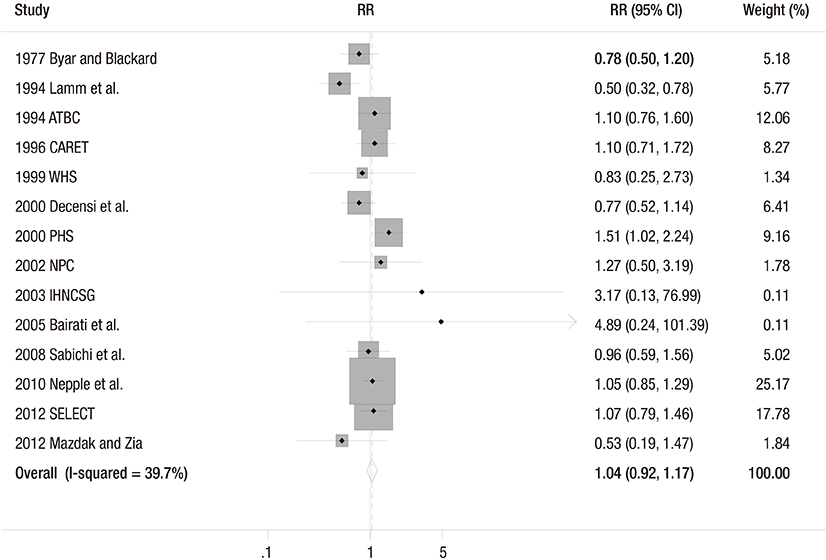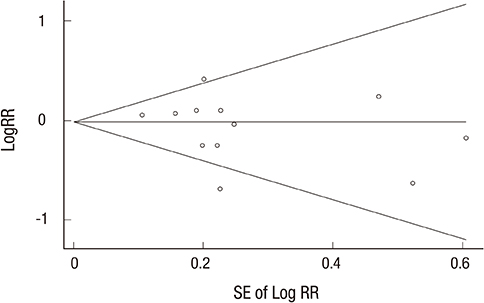J Korean Med Sci.
2017 Apr;32(4):628-635. 10.3346/jkms.2017.32.4.628.
Effects of Vitamin and Antioxidant Supplements in Prevention of Bladder Cancer: a Meta-Analysis of Randomized Controlled Trials
- Affiliations
-
- 1Department of Family Medicine, National Cancer Center, Goyang, Korea. msk@ncc.re.kr
- 2Department of Family Medicine, Yonsei University Graduate School, Seoul, Korea.
- 3Department of Cancer Control and Policy, Graduate School of Cancer Science and Policy, National Cancer Center, Goyang, Korea.
- 4Molecular Epidemiology Branch, Division of Cancer Epidemiology and Prevention, Research Institute, National Cancer Center, Goyang, Korea.
- 5Center for Cancer Prevention and Detection, Hospital, National Cancer Center, Goyang, Korea.
- 6Department of Family Medicine, Yonsei University College of Medicine, Gangnam Severance Hospital, Seoul, Korea.
- KMID: 2371448
- DOI: http://doi.org/10.3346/jkms.2017.32.4.628
Abstract
- This study aimed to investigate the effects of vitamin and antioxidant supplements in the prevention of bladder cancer using a meta-analysis of randomized controlled trials (RCTs). Fourteen RCTs were included in the final analysis. In a fixed-effect meta-analysis, vitamin and antioxidant supplements showed no preventive effect for bladder cancer (relative risk [RR] = 1.04; 95% confidence interval [CI] 0.92-1.17; I² = 39.7%). Also, there was no preventive effect of these supplements in the subgroup meta-analyses by various factors such as type of supplements, type of cancer prevention, methodological quality, providers of supplements, type of control group, and number of participants. Among the subgroup analyses by type of supplements, beta-carotene supplementation alone marginally increased the risk of bladder cancer (RR = 1.44; 95% CI 1.00-2.09; I² = 0.0%; n = 3). The current meta-analysis found that vitamin and antioxidant supplements have no preventive effect against bladder cancer.
Figure
Reference
-
1. Ferlay J, Soerjomataram I, Dikshit R, Eser S, Mathers C, Rebelo M, Parkin DM, Forman D, Bray F. Cancer Incidence and Mortality Worldwide: Sources, methods and major patterns in GLOBOCAN 2012. Int J Cancer. 2015; 136:359–386.2. Torre LA, Bray F, Siegel RL, Ferlay J, Lortet-Tieulent J, Jemal A. Global cancer statistics, 2012. CA Cancer J Clin. 2015; 65:87–108.3. Letašiová S, Medve’ová A, Šovčíková A, Dušinská M, Volkovová K, Mosoiu C, Bartonová A. Bladder cancer, a review of the environmental risk factors. Environ Health. 2012; 11:Suppl 1. S11.4. Burger M, Catto JW, Dalbagni G, Grossman HB, Herr H, Karakiewicz P, Kassouf W, Kiemeney LA, La Vecchia C, Shariat S, et al. Epidemiology and risk factors of urothelial bladder cancer. Eur Urol. 2013; 63:234–241.5. Park SY, Ollberding NJ, Woolcott CG, Wilkens LR, Henderson BE, Kolonel LN. Fruit and vegetable intakes are associated with lower risk of bladder cancer among women in the Multiethnic Cohort Study. J Nutr. 2013; 143:1283–1292.6. Sakauchi F, Mori M, Washio M, Watanabe Y, Ozasa K, Hayashi K, Miki T, Nakao M, Mikami K, Ito Y, et al. Dietary habits and risk of urothelial cancer incidence in the JACC Study. J Epidemiol. 2005; 15:Suppl 2. S190–5.7. Liu H, Wang XC, Hu GH, Guo ZF, Lai P, Xu L, Huang TB, Xu YF. Fruit and vegetable consumption and risk of bladder cancer: an updated meta-analysis of observational studies. Eur J Cancer Prev. 2015; 24:508–516.8. Root MM, McGinn MC, Nieman DC, Henson DA, Heinz SA, Shanely RA, Knab AM, Jin F. Combined fruit and vegetable intake is correlated with improved inflammatory and oxidant status from a cross-sectional study in a community setting. Nutrients. 2012; 4:29–41.9. Byar D, Blackard C. Comparisons of placebo, pyridoxine, and topical thiotepa in preventing recurrence of stage I bladder cancer. Urology. 1977; 10:556–561.10. Lamm DL, Riggs DR, Shriver JS, vanGilder PF, Rach JF, DeHaven JI. Megadose vitamins in bladder cancer: a double-blind clinical trial. J Urol. 1994; 151:21–26.11. The effect of vitamin E and beta carotene on the incidence of lung cancer and other cancers in male smokers. The Alpha-Tocopherol, Beta Carotene Cancer Prevention Study Group. N Engl J Med. 1994; 330:1029–1035.12. Omenn GS, Goodman GE, Thornquist MD, Balmes J, Cullen MR, Glass A, Keogh JP, Meyskens FL Jr, Valanis B, Williams JH Jr, et al. Risk factors for lung cancer and for intervention effects in CARET, the beta-carotene and retinol efficacy trial. J Natl Cancer Inst. 1996; 88:1550–1559.13. Lee IM, Cook NR, Manson JE, Buring JE, Hennekens CH. Beta-carotene supplementation and incidence of cancer and cardiovascular disease: the Women’s Health Study. J Natl Cancer Inst. 1999; 91:2102–2106.14. Decensi A, Torrisi R, Bruno S, Costantini M, Curotto A, Nicolò G, Malcangi B, Baglietto L, Bruttini GP, Gatteschi B, et al. Randomized trial of fenretinide in superficial bladder cancer using dna flow cytometry as an intermediate end point. Cancer Epidemiol Biomarkers Prev. 2000; 9:1071–1078.15. Cook NR, Le IM, Manson JE, Buring JE, Hennekens CH. Effects of beta-carotene supplementation on cancer incidence by baseline characteristics in the Physicians’ Health Study (United States). Cancer Causes Control. 2000; 11:617–626.16. Duffield-Lillico AJ, Reid ME, Turnbull BW, Combs GF Jr, Slate EH, Fischbach LA, Marshall JR, Clark LC. Baseline characteristics and the effect of selenium supplementation on cancer incidence in a randomized clinical trial: a summary report of the nutritional prevention of cancer trial. Cancer Epidemiol Biomarkers Prev. 2002; 11:630–639.17. Toma S, Bonelli L, Sartoris A, Mira E, Antonelli A, Beatrice F, Giordano C, Benazzo M, Caroggio A, Cavalot AL, et al. Beta-carotene supplementation in patients radically treated for stage I–II head and neck cancer: results of a randomized trial. Oncol Rep. 2003; 10:1895–1901.18. Bairati I, Meyer F, Gélinas M, Fortin A, Nabid A, Brochet F, Mercier JP, Têtu B, Harel F, Abdous B, et al. A randomized trial of antioxidant vitamins to prevent second primary cancers in head and neck cancer patients. J Clin Oncol. 2005; 23:5805–5813.19. Sabichi AL, Lerner SP, Atkinson EN, Grossman HB, Caraway NP, Dinney CP, Penson DF, Matin S, Kamat A, Pisters LL, et al. Phase III preventiontrial of fenretinide in patients with resected non-muscle-invasive bladder cancer. Clin Cancer Res. 2008; 14:224–229.20. Nepple KG, Lightfoot AJ, Rosevear HM, O’Donnell MA, Lamm DL; Bladder Cancer Genitourinary Oncology Study Group. Bacillus Calmette-Guérin with or without interferon α-2b and megadose versus recommended daily allowance vitamins during induction and maintenance intravesical treatment of nonmuscle invasive bladder cancer. J Urol. 2010; 184:1915–1919.21. Lotan Y, Goodman PJ, Youssef RF, Svatek RS, Shariat SF, Tangen CM, Thompson IM Jr, Klein EA. Evaluation of vitamin E and selenium supplementation for the prevention of bladder cancer in SWOG coordinated SELECT. J Urol. 2012; 187:2005–2010.22. Mazdak H, Zia H. Vitamin E reduces superficial bladder cancer recurrence: a randomized controlled trial. Int J Prev Med. 2012; 3:110–115.23. Jadad AR, Moore RA, Carroll D, Jenkinson C, Reynolds DJ, Gavaghan DJ, McQuay HJ. Assessing the quality of reports of randomized clinical trials: is blinding necessary? Control Clin Trials. 1996; 17:1–12.24. Higgins JP, Thompson SG. Quantifying heterogeneity in a meta-analysis. Stat Med. 2002; 21:1539–1558.25. Becci PJ, Thompson HJ, Grubbs CJ, Squire RA, Brown CC, Sporn MB, Moon RC. Inhibitory effect of 13-cis-retinoic acid on urinary bladder carcinogenesis induced in C57BL/6 mice by N-butyl-N-(4-hydroxybutyl)-nitrosamine. Cancer Res. 1978; 38:4463–4466.26. Wu HC, Lu HF, Hung CF, Chung JG. Inhibition by vitamin C of DNA adduct formation and arylamine N-acetyltransferase activity in human bladder tumor cells. Urol Res. 2000; 28:235–240.27. Ye C, Zhao W, Li M, Zhuang J, Yan X, Lu Q, Chang C, Huang X, Zhou J, Xie B, et al. δ-tocotrienol induces human bladder cancer cell growth arrest, apoptosis and chemosensitization through inhibition of STAT3 pathway. PLoS One. 2015; 10:e0122712.28. Farbstein D, Kozak-Blickstein A, Levy AP. Antioxidant vitamins and their use in preventing cardiovascular disease. Molecules. 2010; 15:8098–8110.29. Tang JE, Wang RJ, Zhong H, Yu B, Chen Y. Vitamin A and risk of bladder cancer: a meta-analysis of epidemiological studies. World J Surg Oncol. 2014; 12:130.30. Chen F, Li Q, Yu Y, Yang W, Shi F, Qu Y. Association of vitamin C, vitamin D, vitamin E and risk of bladder cancer: a dose-response meta-analysis. Sci Rep. 2015; 5:9599.31. Amaral AF, Cantor KP, Silverman DT, Malats N. Selenium and bladder cancer risk: a meta-analysis. Cancer Epidemiol Biomarkers Prev. 2010; 19:2407–2415.32. He H, Shui B. Folate intake and risk of bladder cancer: a meta-analysis of epidemiological studies. Int J Food Sci Nutr. 2014; 65:286–292.33. Patrick L. Beta-carotene: the controversy continues. Altern Med Rev. 2000; 5:530–545.34. Key TJ, Allen NE, Spencer EA, Travis RC. The effect of diet on risk of cancer. Lancet. 2002; 360:861–868.35. Jeon YJ, Myung SK, Lee EH, Kim Y, Chang YJ, Ju W, Cho HJ, Seo HG, Huh BY. Effects of beta-carotene supplements on cancer prevention: meta-analysis of randomized controlled trials. Nutr Cancer. 2011; 63:1196–1207.36. Bardia A, Tleyjeh IM, Cerhan JR, Sood AK, Limburg PJ, Erwin PJ, Montori VM. Efficacy of antioxidant supplementation in reducing primary cancer incidence and mortality: systematic review and meta-analysis. Mayo Clin Proc. 2008; 83:23–34.37. Cui Y, Lu Z, Bai L, Shi Z, Zhao WE, Zhao B. Beta-carotene induces apoptosis and up-regulates peroxisome proliferator-activated receptor gamma expression and reactive oxygen species production in MCF-7 cancer cells. Eur J Cancer. 2007; 43:2590–2601.38. Druesne-Pecollo N, Latino-Martel P, Norat T, Barrandon E, Bertrais S, Galan P, Hercberg S. Beta-carotene supplementation and cancer risk: a systematic review and metaanalysis of randomized controlled trials. Int J Cancer. 2010; 127:172–184.39. Palozza P, Serini S, Trombino S, Lauriola L, Ranelletti FO, Calviello G. Dual role of beta-carotene in combination with cigarette smoke aqueous extract on the formation of mutagenic lipid peroxidation products in lung membranes: dependence on pO2. Carcinogenesis. 2006; 27:2383–2391.40. Bjelakovic G, Nikolova D, Gluud LL, Simonetti RG, Gluud C. Antioxidant supplements for prevention of mortality in healthy participants and patients with various diseases. Cochrane Database Syst Rev. 2012; CD007176.
- Full Text Links
- Actions
-
Cited
- CITED
-
- Close
- Share
- Similar articles
-
- Efficacy of Vitamin C Supplements in Prevention of Cancer: A Meta-Analysis of Randomized Controlled Trials
- Vitamin D and Risk of Respiratory Tract Infections in Children: A Systematic Review and Meta-analysis of Randomized Controlled Trials
- Efficacy of Ginseng Supplements on Fatigue and Physical Performance: a Meta-analysis
- Prophylactic efficacy of probiotics on travelers' diarrhea: an adaptive meta-analysis of randomized controlled trials
- Antioxidant Supplementation for Erectile Dysfunction: Systematic Review and Meta-Analysis of Double-Blind, Randomized, Placebo-Controlled Trials




